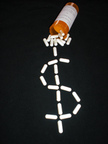
One year ago to this day, we posted a blog about the case of Davids v. Novartis Pharmaceuticals Corp. Plaintiff Barbara Davids, suffering from breast cancer, commenced taking the drug Zometa which is manufactured by Novartis Pharmaceuticals Corp. The purpose for taking the drug was to suppress metastatic damage to her bones. Thereafter, Davids developed osteonecrosis of her jaw, which her doctors opined was caused by the drug Zometa. As a result of her osteonecrosis, Davids was compelled to undergo multiple procedures, including but not limited to, the removal of portions of her jaw and denture implantation as replacement for lost teeth. Davids claimed that after years of procedures she was rendered disfigured, anxiety stricken, has mastication disfunction and permanent facial parasthesia.
The jury found that plaintiff's osteonecrosis was caused by the drug Zometa, that defendant failed to adequately discose the drug's potential hazards and thereby breached Zometa's implied warranty of merchantability. $10 million dollars was awarded in punitive exemplary damages, $350,000 was awarded for past pain and suffering and $100,000 was awarded for future pain and suffering, for a toal award of $10.45 million.
Upon motion by defendant, United States District Court Judge Arthur D. Spatt has reduced the jury award of punitive damages by 91 % from $10,000,000 to a mere $900,000. This represents a clear victory for Big Pharma as the new punitive award is comparable to a mere slap on the hand. One main purpose of punitive damages is to punish the offending party for its reprehensible behavior, so as to prevent recurrence. Unfortunately, making a big pharmaceutical company pay only $900,000 is tantamount to almost no punishment at all. A cost analysis would likely reveal that such a minimal award, is likely to encourage recurrence of the offending act instead of discouraging it.
In all fairness to Judge Spatt, an ill conceived New Jersey law did limit the amount of punitive damages to five times the compensatory award. In this case, that would set the maximum punitive award at 2.25 million dollars. Therefore at the very least, until New Jersey's self defeating law limiting punitive damages is expunged from the books, the punitive damages should have been reduced to no less than the maximum allowed by law. Evidently, the power and reach of Big Pharma is both far and wide.
Long Island Lawyer
Paul A. Lauto, Esq.


 RSS Feed
RSS Feed

